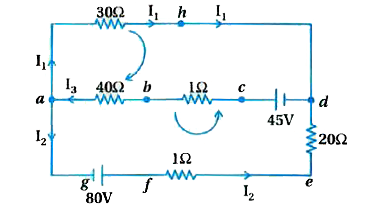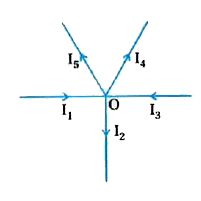Write and explain kirchhoff's first law (junction law).Solution in Gujrati
⇒ Statement : At any junction, the sum of the currents entering the junction is equal to the sum of currents leaving junction.
⇒ This applies equally well it instead of a junction of serval lines, we consider point on line.

⇒ In figure current coming out of. a. is I1+I2 and current coming toward junction is I3 .
∴ From Kirchhoff.s law,
I3=I1+I2
⇒ Proof of this rule follows from the fact that when current are steady there is no accumulation of charges at junction or at any point in a line. That means charge is conserved.
Whatever amount of charge enter in given time at a point or junction similar amount of charge will flow out through that point or junction in same time.
In figure shown I1 current enter at point h and same current I1 flow out through that point means charge is conserved at point h.
⇒ Kirchhoff.s first law is based on the conservation law of charges.
Kirchoff.s first rule : " The algebraic sum of currents flowing through any junction is equal to zero. "
.O. is a junction of one network I1,I2.....I5 are the electric currents having arbitrary direction.

Suppose Q1,Q2....Q5 are charges, for the currents I1,I2....I5 repsectively. Then , Q1=I1,t,Q2=I2t,........Q5=I5t.
The charges coming to the junction in time t is Q1+Q3, while that receding from junction is Q2+Q4+Qs.
Accroding to the law of conservation of electric charge.
Q1+Q3=Q2+Q4+Q5
∴I1t+I3t=I2t+I4t+I5t [ from equ. (1)]
∴I1=I3=I2+I4+I5
∴I1−I2+I3−I4−I5=0
∴I1+(−I2)+I3+(−I4)+(−I5)=0...(2)
∴5∑i=1Ii=0
Where, i = 1 , 2 ... 5 Krichhoff.s first law.
hence, the algebraic sum of currents meeting at any junction is zero.
here, current coming towards the junction is considered positive and current going out of the junction is considered negative. we can choose reverse convention also .
Topper's Solved these Questions
- CURRENT ELECTRICITYBOOK - KUMAR PRAKASHANCHAPTER - CURRENT ELECTRICITYEXERCISE - SECTION [A] TRY YOURSELF
74 Videos
- CURRENT ELECTRICITYBOOK - KUMAR PRAKASHANCHAPTER - CURRENT ELECTRICITYEXERCISE - SECTION [B] NUMERICALS (NUMERICAL FROM TEXTUAL ILLUSTRATIONS)
14 Videos
- BOARD'S QUESTION PAPER MARCH-2020 BOOK - KUMAR PRAKASHANCHAPTER - BOARD'S QUESTION PAPER MARCH-2020 EXERCISE - PART-B SECTION -C
4 Videos
- DUAL NATURE OF RADIATION AND MATTERBOOK - KUMAR PRAKASHANCHAPTER - DUAL NATURE OF RADIATION AND MATTEREXERCISE - Section-D (MCQs asked in GUJCET/Board Exam)
1 Videos
Similar Questions
What is reason behind producing electric force between two particles ?
View Solution(a) Esttimate the average drift speed of conduction electrons in a copper wite of cross-secttonal area 1.0×10−7m2 carrying a current of 1.5A. Assume the each copper atom contrbutes roughly one conduction electron. The density of copper is 9.0×103kg/m3, and its atomic mass is 63.5u. (b) Compare the drift speed obyained above with, (1) thermal speeds of copper atoms at ordinary temperaturtes. (ii) speed of propagation of electric field along the conductor which causes the drift motion.
View SolutionDerive an expression for current I passing through an AC circuit containing only inductor L. Draw a Phasor diagram and graph of v and I versus ωt. Explain instantaneous power and the average power.
View SolutionMass of photon in motion is ………
View SolutionKIRCHHOFF'S FIRST LAW
View SolutionKirchhoff's first law i.e., ∑I=0 at a junction is based on the law of conservation of
View Solutionकिरचॉफ का द्वितीय नियम (वोल्टता नियम ) लिखिए तथा चिन्ह परिपाटी समझाइये ।
View SolutionState Kirchhoff's Junction Law.
View SolutionWhat is Kirchhoff's first law?
View SolutionKirchoff'slaw i.e., ∑i=0, at a junction, deals with the conservation of
View SolutionState the sign convention for applying Kirchhoff's first rule.
View SolutionWrite and explain Kirchhoff's second law (Loop rule).
View SolutionKirchhoff's law of junctions (first law), Kirchhoff's law of meshes (second law) are respectively based on
View SolutionKirchhoff's first law i.e., ∑I=0 at a junction is based on the law of conservation of
View SolutionExplain : Kirchhoff's first laws is in accordance with law of conservation of charge.
View Solution
